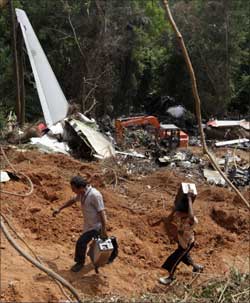 | « Back to article | Print this article |
The Mangalore air crash is set to take a toll on the insurance bill of at least three airlinesc - Air India, Kingfisher and IndiGo - whose insurance covers are coming up for renewal in the next couple of months.
 Other airlines such as Jet Airways, however, may remain unaffected, for now, as their insurance is not due for renewal in the near future.
Other airlines such as Jet Airways, however, may remain unaffected, for now, as their insurance is not due for renewal in the near future.
Air India, which this year preferred a consortium of private sector players led by Reliance General, had in fact started feeling the heat even before the crash took place on Saturday.
Last week, the insurance companies, citing an earlier incident, slapped an additional premium demand of $3.25 million (Rs 15 crore) on the airline. Air India, which has always insured with public sector players led by New India Assurance, had purchased a $8.59-billion (Rs 40,000 crore) cover, for which it had paid $24.3 million (Rs 113 crore at present exchange rates) as premium.
The public sector carrier now faces the prospect of its insurance bill going up by around 13 per cent, sources close to the development told Business Standard.
In addition to Reliance, Iffco Tokio, Bajaj Allianz and HDFC Ergo were part of the consortium.
The insurers have said that while quoting the premium, which was $600,000 (around Rs 2.8 crore) less than New India-led consortium's bid, they did not factor in a $18 million (around 84 crore) hull loss due to an accident in Mumbai on September 4, 2009.
"Reliance General-led consortium is the insurer for Air India fleet of aircraft. However, as a policy, we do not comment on individual policy details or specific customer claims," a Reliance General spokesperson said.
Sources familiar with the development, however, said talks between the airline, the lead insurer and the broker took place before the Mangalore accident and Air India was trying to impress upon the insurers that there was no need to pay the additional premium. "After the crash, it is unlikely that the insurers will agree to the request," said a source.
Insurance industry sources said the Mangalore accident, in which 158 people were killed, is expected to cause a Rs 450 crore (Rs 4.5 billion) dent.
Earlier this month, an aircraft belonging to Libyan airline Afriquiah Airways had crashed and that will also result in an impact on the global aviation insurance market with claims estimated to be in the region of over $275 million (over Rs 1,270 crore).
General Insurance Corporation, which is now the fifth largest international player in the aviation insurance space, is expected to take a combined hit of nearly Rs 120 crore (Rs 1.2 billion) from the two accidents, putting some pressure on its risk-taking ability. It was earlier impacted by air crashes involving Air France and Iran Air aircraft.
"Things are not very comfortable given that there have been two accidents this month. Some of the renewals will come under pressure," said a senior GIC executive.
Insurance brokers said premium rates have already hardened by 10-15 per cent.
Kingfisher and Indigo policies will come up for renewal over the next two months. For airlines the premium rates vary between 0.5 per cent and 1 per cent of the sum assured.
Though insurers retain very little risk on their books and place over 90 per cent of it with a group of reinsurance companies, the recent incidents have forced reinsurers to look at the rates afresh.
"The rates may go up as following the recent incidents. Premium is the function of claims and is directly proportional to the risk perception," said an insurance broker.
Image: Workers carry apparatus from the wreckage of a crashed Air India Express passenger plane in Mangalore. | Photograph: Rupak De Chowdhuri/Reuters